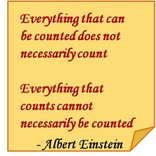Last month, I wrote to a few people I know who are research buyers / consumers about what they expect from qualitative research and researchers. The one thing that I read repeatedly through many of those responses was that :
Researchers ought to have an understanding of the BIGGER PICTURE....an appreciation of what is the research being done for...how will it impact the client's business, what are they trying to achieve through the research, have an understanding of the dynamics that prevail in the industry that your client's operate in!
Flip the side of the coin and you find that client briefs (at least in India) tend to be skeletal at best and researchers lament about not being given the business backdrop against which the research is being planned...about not being given enough time or opportunity to discuss why the research is being done...or how the information gathered through research would be used...what sort of a decision would it help the client take ?
As a researcher I have felt frustrated at being told only half the story and sometimes not even that, though when I stepped back and thought about this issue, it seemed a little ironical - how, both the client and the researcher expect the same thing from each other - and yet many a time - there remains a large gap in communication and in the understanding of the BIGGER PICTURE.
At about the same time I was thinking about this, I happened to read Dr Sheila Keegan's article - Emerging to a brave new world.
Problem Definition - outside of the research process
Amongst other things, on page 3 she talks about one of the possible reasons for this gap -
That 'problem-definition' has not always been considered part of the research process. She goes on to say...
"From a researcher perspective, this area is fraught. Historically the client defines ‘the problem’. But, from a process consultant perspective, the client ‘often does not know what she is looking for and indeed should not really be expected to know’ (Schein, 1999). A change of expectations and working relationships between clients and researchers is needed before problem definition is widely accepted as a valid research area."
Vendor v/s Stakeholder
The other reality to this issue is that historically research agencies (unlike advertising agencies who have has always enjoyed the status of a stakeholder to a brand) have been looked at as mere vendors. With brand managers often been given new portfolios every few years and advertising agencies not always retaining their accounts, sometimes the research agency de facto becomes the reservoir of knowledge on a brand, yet suffers from the perception of being considered an 'outsider'
Implicit expectation from the researcher
My last hypothesis on this issue is that maybe...just maybe client's implicitly 'expect the researcher to have and active understanding of their business and therefore expect the researcher to ASK the questions that would clarify the business objectives relevant for research. The onus is then on the researcher to seek or clarify the research brief.
Whatever be the reason, there is no debate on the fact that it is imperative to the efficacy of research that the business context be understood - if as a researcher you are not handed down that knowledge on a platter, may be you just got to try harder.
Thanks to Christine, Neil, Poor_Planner, Naveen & Saurabh for contributing their thoughts on the subject !
Aug 1, 2007
On why researchers do not appreciate 'the bigger picture'
Posted by
Reshma Bachwani
at
3:40 PM
![]()
Subscribe to:
Post Comments (Atom)


2 comments:
Great topic. I have found that some clients are quite willing to have help defining the issues and constructing the research objectives, and others provide very little context. In the latter case, I believe this may sometimes be because a research project manager does not themselves understand the business issues all that well.
However, we owe it to clients and to ourselves to at least try to get this kind of dialogue started.
Great post, love the graphic!
Reshma, I really like how you have framed this topic. Nice job!
Post a Comment